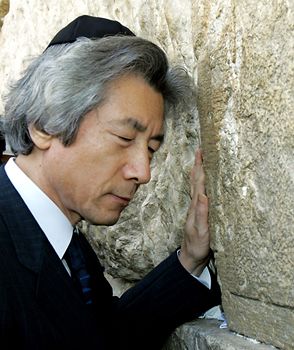Washington Post columnist Charles Krauthammer has a silly and misinformed column arguing that the US needs to allow Japan to arm themselves with nuclear weapons to protect against North Korea. Right. The nuclear weapons program that Japan has been longing for all these years and has only refrained from starting because of US pressure.
Japan is a true anomaly. All the other Great Powers went nuclear decades ago — even the once-and-no-longer great, such as France; the wannabe great, such as India; and the never-will-be great, such as North Korea. There are nukes in the hands of Pakistan, which overnight could turn into an al-Qaeda state, and North Korea
I’m frankly surprised at how bad his reasoning is in this column, how much it sounds like the writing of an enthusiastic but narrowly informed freshman in Poly-sci class.
The fact of the matter is that Japan does not have nuclear weapons because the Japanese population is almost unanimously opposed to the idea. Yes, a couple of higherups in the LDP have suggested the idea of maybe talking about considering discussion of the issue, but quite frankly I cannot think of a better way for them to finally start losing elections seriously than to make the acquisition of nuclear weapons part of their official party policy.
His last paragraph is particularly absurd.
Why are we so intent on denying this stable, reliable, democratic ally the means to help us shoulder the burden in a world where so many other allies — the inveterately appeasing South Koreans most notoriously — insist on the free ride?
This is a mind boggling reversal of reality. Yes, South Korea has been friendly to North Korea. (Unlike some people they actually have to live next door to the crazy man with the gun, which suggests a different perspective from the other side of the Pacific.) But they also have a draft for all adult males, which can hardly be a free ride. Not to mention that fact that South Korea actually DID have a program to develop nukes a couple of decades back, which the US forced them to abandon.
On the other hand, Japan actually DID have a long-term policy of insisting on a free ride. Following the end of the US occupation, the US actually tried to persuade the Japanese government to abandon the principle of pacificism that the US had forced on them only a few years before, and rebuild their military so that they could participate in the Korean war. Japan refused to have even a token military for many years, using the pacifist constitution as an excuse to keep from spending any national resources, capital or human, on military or weapons-a policy that was partly responsible for the country’s fantastic industrial development.
Cold economics were of course not the only reason for Japan to keep from investing in a military for so long. After the disastrous defeat of World War II, culminating in the only use of a nuclear weapon so far, were was also a widespread belief that war was a failed strategy for national success, and that lesson has over the decades transformed into a very strong and nearly universal value of national pacifism.
I see political campaign posters every day calling for the protection of the pacifism clause of the constitution (Article 9), and anti-war and especially anti-nuclear messages are more common and mainstream here than in any other country of which I am aware. In fact, I have never even seen a public protest or demonstration in Japan that did not include that message in some capacity.
I think this comment left by some Japanese person on the Washington Post site says it well.
Get a grip Charlie. While there is an active right wing here of course, the majority in this country where I live is so opposed to nuclear weapons that it would defy your comprehension. Many people here would simply choose non-existence total elimination of both the nation and state of Japan over nuclear weapons possession, let alone use. The Japanese government would run out of fire hoses to put down the demonstrations. Calls for a nuclear Japan are still very premature, and indicate a lack of familiarity with the culture. It aint gonna happen anytime soon.
I think the bit about choosing “non-existence total elimination of both the nation and state of Japan” is frankly over the top, and if Japan were faced for some reason with a genuine war they would came around to full acceptance of their military, but not as things stand now.
Japan’s best offense is their lack of capability for offense. Yes, North Korea distrusts Japan more than anyone, but even they know that Japan is bound by their constitution, laws, and tradition not to use their military for combat purposes unless they are attacked first. North Korea does have to worry about the very real (if unlikely) threat of military action on the part of the US, South Korea or even China, but as long as they do not attack Japan first, Japan is no threat to them-and that more than anything else is what keeps Japan safe today.
[Addendum]: I should have mentioned that the policy of specifically relying on US military protection and instead developing the industrial economy is not a theory of mine, but the Yoshida Doctrine, named after the postwar Prime Minister Shigeru Yoshida , who was incidentally Aso’s grandfather.

